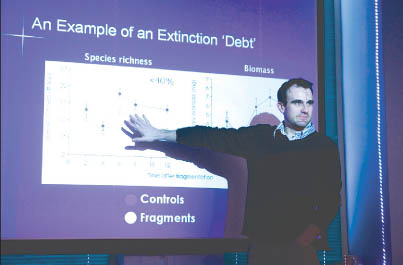(In)Reaching for the STARS

Andrew Gonzales, Canada Research Chair in Biodiversity, conducts a STARS lecture.
CLAUDIO CALLIGARIS
It was just over a year ago that STARS (Science Talks About Research for Staff), the innovative "in-reach" program for the Faculty of Science's administrative and technical staff, was born. The idea behind STARS is quite simple: it's a means of bridging the gap between Faculty of Science researchers and those who work behind the scenes to support them. Once a month, faculty-based scientists give an informal, accessible talk about their work to support staff over the lunch hour. Everyone from lab technicians to database managers to administrative assistants is invited to listen to the researchers explain what they do and why they do it.
"This is an excellent way to engage staff that don't always get exposed to the science," explains biology professor Andrew Gonzalez, who recently presented his work on biodiversity loss at a STARS luncheon. "From a professor's point of view, it forces us to put things into a broader picture, which then feeds back into our teaching." What's more, he explains that STARS is not only a way of giving back to science staff, but it's also a means of exposing them to the science and engaging them on some of the bigger issues.
It appears to be working. STARS organizer and Science Outreach Coordinator Ingrid Birker reports that the Q&A sessions sometimes run longer than the presentations and the talks regularly elicit emailed comments and questions for the presenters for days following each session. Birker estimates that about 25 percent of staff attend each month. Though lunch is provided courtesy of Dean Martin Grant, Birker is sure that the program's popularity has more to do with a love for science than for sandwiches. "There are people coming to the talks armed with pointed questions and downloaded research papers. They don't just want a free lunch, though it is a nice perk."
Pauline Nesbitt, an administrative assistant in the Department of Geography, makes a point of attending as many STARS sessions as she can and encourages her staff to do the same. "There are all these great minds, but we often don't have a clue as to what they're working on," said Nesbitt. "It's very exciting and stimulating for us, when we know what they're doing. And this is unique because the presenters come knowing who's in their audience."
Atmospheric and Oceanic Sciences professor Bruno Tremblay will expound on Arctic climate change at the next STARS session on November 13. This year's STARS line-up may be found at: http://www.mcgill.ca/science/outreach/inreach/.

